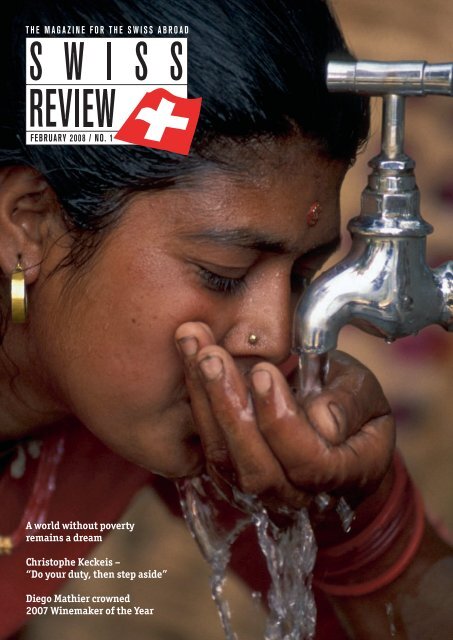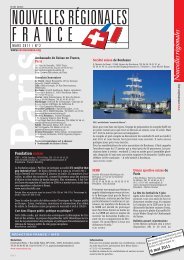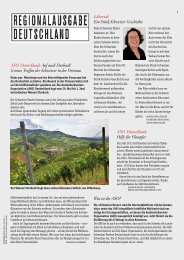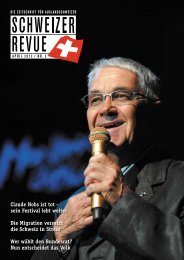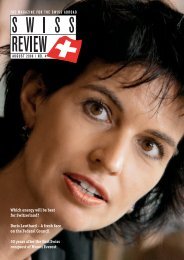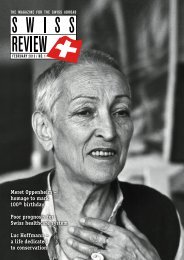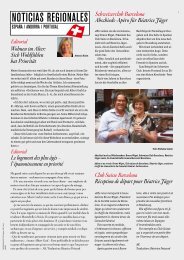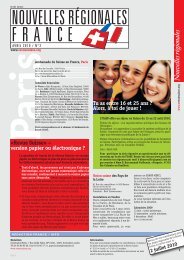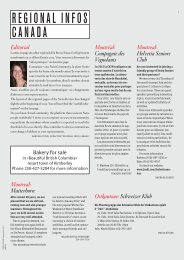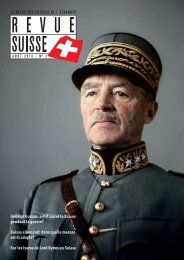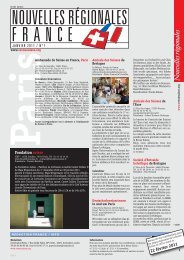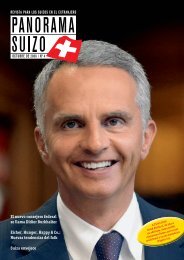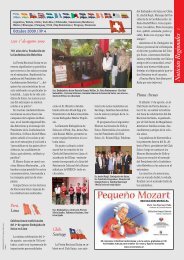Download PDF Swiss Review 1/2008
Download PDF Swiss Review 1/2008
Download PDF Swiss Review 1/2008
You also want an ePaper? Increase the reach of your titles
YUMPU automatically turns print PDFs into web optimized ePapers that Google loves.
THE MAGAZINE FOR THE SWISS ABROAD<br />
FEBRUARY <strong>2008</strong> / NO. 1<br />
A world without poverty<br />
remains a dream<br />
Christophe Keckeis –<br />
“Do your duty, then step aside”<br />
Diego Mathier crowned<br />
2007 Winemaker of the Year
EDITORIAL<br />
CONTENTS<br />
3<br />
Stable <strong>Swiss</strong> democracy<br />
Nobody seriously thought that christoph blocher would be voted off the<br />
Federal Council. So it was all the more astonishing when it actually happened<br />
and Blocher’s seat went to Grisons finance chief Eveline Widmer-Schlumpf.<br />
While the left of the council celebrated after the votes were counted, there was consternation<br />
and disappointment on the right.<br />
While it was an open secret that the Minister for Justice would not get the votes of<br />
the Social Democrats, the Greens or many members of the Christian Democrats in his<br />
re-election attempt, the fact that Blocher did not get the backing he needed from the<br />
Liberal Democrats to secure his re-election was completely unexpected.<br />
Most political commentators agreed that Christoph Blocher was not voted out for<br />
the way he ran his department. On the contrary, he was widely credited for the efficient<br />
and cost-conscious management of the Department of Justice. Nor was his political stance<br />
likely to have been the reason why many Liberal Democrats wanted him off the Federal<br />
Council. His sometimes uncouth manner and high-handed attitude would seem to<br />
explain his political demise. Such a domineering, omnipresent member of the Federal<br />
Council, who was unsuited to our country’s collegial system of government, was no longer<br />
acceptable to many centre-right politicians.<br />
In his departing speech to parliament, Christoph Blocher apologised for his frequent<br />
verbal attacks and asked for forgiveness from anyone he may have offended in the last<br />
four years.<br />
The role the SVP will take up on the opposition benches will not become clear until<br />
the next parliamentary session. We will also soon find out how SVP Federal Councillors<br />
Samuel Schmid and Eveline Widmer–Schlumpf – who are not being supported by<br />
their party – will operate in a party-political vacuum. Christoph Blocher – the SVP’s<br />
Vice-Chairman and financial backer – will become the party’s head<br />
of research, strategy and campaign management. The 68-year-old<br />
will therefore continue to play an important role in <strong>Swiss</strong> politics.<br />
Rolf Ribi’s article on <strong>Swiss</strong> development cooperation starts<br />
with a quotation by Christoph Blocher, who repeatedly questioned<br />
its benefits. Blocher was vehement in his criticism of the<br />
CHF 400 million in aid sent to Africa each year.<br />
The fact is that Switzerland is contributing increasingly less<br />
Heinz Eckert<br />
funds to development work, as the statistics show. In 2006, <strong>Swiss</strong><br />
development aid amounted to 0.46% of GDP. Among the twenty-two OECD donor<br />
countries, Switzerland‘s contribution to aid ranks eleventh, well below the 0.7% proposed<br />
by the UN.<br />
The ousting of Christoph Blocher from the Federal Council is unlikely by itself to<br />
result in an increase in Switzerland’s contribution. All that will happen is that discussions<br />
will be somewhat calmer and the issue will cause more argument than controversy.<br />
Otherwise everything will remain as it always has been. Why? Because <strong>Swiss</strong> democracy<br />
is inherently stable.<br />
HEINZ ECKERT, EDITOR-IN-CHIEF<br />
Ex-Federal Councillor Christoph Blocher in his new/old<br />
function. By cartoonist Peter Schrank in the Basler<br />
Zeitung.<br />
5<br />
Mailbag<br />
5<br />
Books: Max Daetwyler – Apostle of Peace<br />
7<br />
Images: William Tell, a star of advertising<br />
8<br />
Switzerland is providing less and less<br />
development aid<br />
Regional news<br />
11<br />
How Federal Councillor Blocher<br />
was voted out<br />
12<br />
Notes from Parliament<br />
14<br />
Interview: Christophe Keckeis, the <strong>Swiss</strong><br />
army’s commander-in-chief, takes stock<br />
16<br />
OSA news<br />
18<br />
A profile: Diego Mathier, Winemaker<br />
of the Year for 2007<br />
19<br />
News in brief<br />
Cover: Water is a coveted asset in Nepal, too.<br />
Photo: Helvetas<br />
SWISS REVIEW February <strong>2008</strong> / No. 1<br />
IMPRINT: “<strong>Swiss</strong> <strong>Review</strong>”, the magazine for the <strong>Swiss</strong> abroad, is in its 35rd year of publication and is published in German, French, Italian, English and Spanish in 20 regional editions.<br />
It has a total circulation of 400 000. Regional news appears four times a year.<br />
■ EDITORS: Heinz Eckert (EC), Editor-in-Chief; Rolf Ribi (RR), René Lenzin (RL), Alain Wey (AW), Gabriela Brodbeck (BDK), responsible for “Notes from Parliament”, Service for the<br />
<strong>Swiss</strong> Abroad, DFA, CH-3003 Berne Translation: CLS Communication AG ■ POSTAL ADDRESS: Publisher, editorial office, advertising: Organisation of the <strong>Swiss</strong> Abroad, Alpenstrasse 26,<br />
CH-3006 Berne, Tel.: +4131356 6110, Fax: +4131356 61 01, Postal account (<strong>Swiss</strong> National Giro): 30-6768-9. Internet: www.revue.ch ■ E - M A I L : revue@aso.ch ■ PRINT: Zollikofer AG,<br />
CH-9001 St.Gallen. ■ CHANGE OF ADDRESS: Please advise your local embassy or consulate. Do not write to Berne.<br />
Single copy: CHF 5 ■
Advertising feature<br />
www.soliswiss.ch now in five languages<br />
To coincide with its 50th anniversary, Soliswiss has<br />
launched an attractive, user-friendly website in five<br />
languages. Check it out! Visit us at www.soliswiss.ch<br />
Felix Bossert, Director of Soliswiss with<br />
overall responsibility for the new website<br />
«Our members live in 144 countries around<br />
the world. The fastest and most convenient<br />
way of publicising our attractive products<br />
is the Internet. The fi rst version contained<br />
German and French versions. This was<br />
then expanded to include English, Italian<br />
and Spanish, and our messages were made shorter and snappier.<br />
We look forward to feedback from around the world!»<br />
Hans Grüninger of Weiersmüller<br />
Bosshard Grüninger WBG, AG für<br />
visuelle Gestaltung, Zurich,<br />
responsible for the graphics<br />
«The aim of the new website is to inspire<br />
Internet users to check out the services<br />
provided by Soliswiss. Clear, contemporary<br />
graphics allow them to immediately identify<br />
and understand what Soliswiss is all about and what type of benefi ts<br />
they can derive from Soliswiss products.<br />
The website layout is based on horizontal levels with different<br />
emphases and colouring. The familiar visual language is supplemented<br />
by imagery refl ecting the four core activity areas of Soliswiss.<br />
Textual and visual information is graphically applied in a controlled<br />
but entertaining manner so as to enable visitors to prioritise visual<br />
content. This guides the user as he or she navigates smoothly from<br />
the essentials to the details.»<br />
Robert Roos and<br />
Alice Baumann, text<br />
experts, responsible<br />
for the editing<br />
of textual content<br />
«In an age obsessed<br />
with the visual, texts<br />
have a diffi cult time<br />
being noticed. Text should therefore be as simple, short and understandable<br />
as possible. Faced with the complex issues contained<br />
in the new Soliswiss website, our team tried to come up with texts<br />
that could be read and understood with as little effort as possible.<br />
The ultimate goal of reading is to elicit a response – to instil trust<br />
in Soliswiss products.»<br />
Patrick Schürmann of Adwired AG,<br />
Zurich, responsible for consulting<br />
and design<br />
«The main aim of the new website was to<br />
offer users more information with fewer<br />
mouse-clicks. In short: To simplify the search<br />
for information and enhance the presentation<br />
of Soliswiss products.<br />
This includes an easy-to-follow product range structure and<br />
streamlined content, particularly for potential policyholders, as well<br />
as direct access, for example, to damage claims for existing clients.<br />
Plus a new feature: To enhance the quality of content even further,<br />
boxes adjacent to the product pages provide regularly updated information<br />
on topics of interest and details of special Soliswiss offers.<br />
The new-look Soliswiss website with its contemporary structure<br />
makes fi nding information child’s play.»<br />
SWISS REVIEW February <strong>2008</strong> / No. 1
MAILBAG<br />
BOOKS<br />
5<br />
SWISS REVIEW February <strong>2008</strong> / No. 1<br />
Switzerland extends beyond<br />
the German-speaking part<br />
What are we to make of a<br />
“<strong>Swiss</strong> <strong>Review</strong>,” which is supposedly<br />
a publication for<br />
<strong>Swiss</strong> people abroad, when it<br />
is only a pale reflection of<br />
Switzerland and its diversity?<br />
Issue No. 5 for October 2007<br />
is a particularly good example<br />
of there being little of interest<br />
for French-speaking or Italian-speaking<br />
<strong>Swiss</strong> in the<br />
“<strong>Swiss</strong> <strong>Review</strong>”. You would<br />
think that Switzerland stops<br />
at the German-speaking<br />
boundaries! Apart from the<br />
fact that the editorial and all<br />
of the background articles,<br />
with the exception of one,<br />
were written in German and<br />
published as approximate<br />
translations, the topics too often<br />
overlook our country’s<br />
minority-language areas in<br />
spite of the intentions indicated<br />
by the front-page claim.<br />
A good example in this issue<br />
is the article by Rolf Ribi entitled<br />
“<strong>Swiss</strong> newspaper market<br />
in flux” which aims to carry<br />
out a “review of Switzerland’s<br />
newspaper landscape.” In the<br />
three pages that make up the<br />
article, only three lines address<br />
the situation of the<br />
press in French-speaking<br />
Switzerland, while Italianspeaking<br />
Switzerland is overlooked<br />
completely. Worse<br />
still, the drawing by a Frenchspeaking<br />
caricaturist (Chappatte),<br />
which is about a<br />
French-<strong>Swiss</strong> subject of national<br />
interest – the victory of<br />
the Alinghi catamaran in the<br />
America’s Cup – is published<br />
in German. It must be recognised<br />
that articles written by<br />
journalists of <strong>Swiss</strong>-German<br />
mother tongue determine<br />
how our country is looked at,<br />
limiting Switzerland to the<br />
German-speaking part. For a<br />
publication that is supposed<br />
to be for the <strong>Swiss</strong> abroad<br />
community as a whole, it un-<br />
fortunately does not reflect<br />
the rich diversity of all the<br />
country‘s parts.<br />
DAVID J. L. BONGARD<br />
Campaign advertising<br />
I already expressed my views<br />
against advertising by political<br />
parties in the “<strong>Swiss</strong> <strong>Review</strong>”<br />
in the run-up to the parliamentary<br />
elections. I was<br />
pleased to read the letter by<br />
Georg Ehret from the USA<br />
who was spot-on when he referred<br />
to “manipulation of voting.”<br />
Your editorial comment,<br />
“All parties were free to place<br />
ads” has to be considered in<br />
the light of the election report<br />
on page 14 where RR says:<br />
“It (the <strong>Swiss</strong> People’s Party -<br />
SVP) clearly has unlimited<br />
financial resources, which it<br />
does not have to disclose.”<br />
The right-wing political<br />
propaganda received as much<br />
“understanding” abroad as<br />
UBS’s loss of billions of francs<br />
or the infamous “grounding”.<br />
Both damage the image of<br />
“Idee Suisse”. Your publication<br />
should steer away from<br />
politics and focus on providing<br />
factual reports. Otherwise,<br />
the “<strong>Swiss</strong> <strong>Review</strong>” is OK.<br />
The report on Einsiedeln<br />
Abbey was very interesting.<br />
BRUNO NEIDHART, CONSTANCE,<br />
GERMANY<br />
Thank you<br />
As a <strong>Swiss</strong> person from<br />
abroad, I look forward to receiving<br />
each copy of the magazine,<br />
which keeps me up to<br />
date and in touch with my beloved<br />
Switzerland. I am privileged<br />
to know Switzerland<br />
and the first time I went, I discovered<br />
for myself what people<br />
say in Argentina: Switzerland<br />
is a tidy, clean,<br />
meticulous and friendly country<br />
– please keep it that way!<br />
Thank you!<br />
HUGO KLINKE, BUENOS AIRES,<br />
ARGENTINA<br />
In the course of the 20th century, war and tyranny cost more<br />
than 160 million people their lives. Confllict and mass destruction<br />
seem to be the fate of mankind. A small <strong>Swiss</strong> with<br />
a flowing white beard spent 60 years trying to stem the seemingly<br />
relentless tide of senseless killing: Max Daetwyler travelled<br />
half the world with his white flag, waging a non-violent<br />
campaign for peace.<br />
It all began on 5 August 1914 with a thoroughly un-<strong>Swiss</strong><br />
incident on the parade ground of Frauenfeld barracks, when<br />
fusilier Max Daetwyler, the second youngest of twelve children<br />
born to a respected family from Arbon in Eastern Switzerland,<br />
refused to take the oath of allegiance just as the<br />
First World War was breaking out. Responding to his commanding<br />
officer, this fusilier with six military refresher<br />
courses behind him said, “I am against the war. I will not<br />
swear the oath.“ He was the first <strong>Swiss</strong> man to refuse to take the<br />
oath, for which he was temporarily sent to a lunatic asylum and<br />
subsequently declared unfit for service. But this was to be the start<br />
of Daetwyler’s lifelong mission for world peace. With his legendary<br />
white flag, he travelled half the globe, preaching his grand idea of<br />
friendship and brotherhood in Moscow, Washington, New York, Geneva,<br />
Berlin and Cairo. His image went around the world. Time and<br />
again, Daetwyler would seek an audience with those in power, but<br />
neither in Moscow nor in Washington was he ever able to meet the<br />
great and powerful in person.<br />
While Max Daetwyler was dismissed by some as a deviationist<br />
fool, others marvelled at his selfless dedication and the depth of<br />
his conviction. His only moral authority was the voice of his conscience,<br />
which he followed throughout his life. And nothing could<br />
break his will and determination to campaign for an end to senseless<br />
wars throughout the world. He even served countless prison<br />
terms and submitted himself to six psychiatric assessments. It was<br />
not until after his death in 1976 that he was recognised as a <strong>Swiss</strong><br />
icon of the 20th century.<br />
Journalist Stephan Bosch has examined the extensive collection<br />
of Max Daetwyler’s personal effects in the Federal Archive in<br />
Berne and has written an extremely accurate, objective and entertaining<br />
biography entitled “Max Daetwyler: Der Friedensapostel“<br />
(Max Daetwyler: Apostle of Peace). He portrays a long life shaped<br />
by numerous dramatic events, family crises and an unceasing campaign<br />
for peace. Daetwyler’s biography has also become an important<br />
historical record, reflecting the thinking and world view of<br />
<strong>Swiss</strong> officialdom in the period from the First World War until the<br />
death of the Apostle of Peace. Attempts were repeatedly made to<br />
have Daetwyler committed for psychiatric treatment, but his local<br />
community in Zumikon defended their<br />
fellow citizen, pointing out, quite legitimately,<br />
that he was a man who did no-one<br />
any harm.<br />
Stephan Bosch’s book is as engrossing<br />
as a good novel.<br />
EC<br />
Voice of his conscience<br />
STEPHAN BOSCH: Max Daetwyler: Der Friedensapostel.<br />
Mit der weissen Fahne um die Welt.<br />
Rüffer & Rub, Zurich, 2007. Available in German<br />
only.
6<br />
MAILBAG<br />
<strong>Swiss</strong>air in the dock<br />
I am always reading with interest<br />
the “<strong>Swiss</strong> <strong>Review</strong>”. It is always<br />
the special contact with<br />
the old country.<br />
Your article “<strong>Swiss</strong>air in the<br />
dock” caught my special interest.<br />
I am highly surprised to<br />
read about the outcome of the<br />
trial of Buelach ZH. I am<br />
shocked to read that the 19 defendants<br />
including several<br />
former executives of the airline<br />
were cleared and received<br />
compensation, as much as half<br />
a million <strong>Swiss</strong> francs in the<br />
case of Mario Corti.<br />
I agree with the former employees<br />
and creditors who were<br />
furious at the outcome, saying<br />
justice had not been done. Zurich’s<br />
public prosecutor should<br />
be forced to resign and I hope<br />
that Zurich’s Supreme Court<br />
will have to rule on the affair.<br />
Years ago I used <strong>Swiss</strong>air for my<br />
worldwide travelling wherever<br />
possible and I was always very<br />
proud of my decision. I consider<br />
Mario Corti a commercial<br />
“criminal” who should be punished<br />
for the bankruptcy.<br />
I am interested to know the<br />
reaction of the <strong>Swiss</strong> people to<br />
the shameful decision of the<br />
court of Buelach and last but<br />
not least to the <strong>Swiss</strong> Government’s<br />
opinion that justice is<br />
absolutely necessary.<br />
WERNER GRETHER, LOS OSOS, CA,<br />
USA<br />
A double-dose of irony<br />
Thanks for your special issue<br />
about the federal elections. It<br />
reminded me of<br />
one reason<br />
(amongst several)<br />
why I left<br />
Switzerland as<br />
soon as I<br />
reached my<br />
18th birthday.<br />
This special issue<br />
contained<br />
advertisements<br />
from every<br />
<strong>Swiss</strong> political<br />
party, yet only<br />
one of those parties, when<br />
submitting the text of their<br />
ad to The Magazine for the<br />
<strong>Swiss</strong> Abroad, felt it necessary<br />
to translate from German<br />
(a language which I do not<br />
speak nor understand) to<br />
English (the international language<br />
of the <strong>Swiss</strong> abroad):<br />
the SVP/UDC!<br />
For all of their reputation<br />
of racism and close-mindedness,<br />
apparently they were the<br />
only ones interested in talking<br />
to me (and believe me: I am<br />
anything but their target audience<br />
...) And since a double<br />
dose of irony is always better<br />
than a single one, I noticed at<br />
the bottom of the SVP ad<br />
that their “international president”<br />
lives in South Africa!<br />
This is too precious. I wonder<br />
how he likes being the white<br />
sheep in a country of black<br />
ones.<br />
To me, this hilarious episode is<br />
a typical illustration<br />
of the<br />
immeasurable<br />
ethnocentrism<br />
(or, in this<br />
case, linguacentrism)<br />
of<br />
the powerful<br />
<strong>Swiss</strong>-German<br />
majority establishment.<br />
“Why would<br />
we need to<br />
translate our<br />
ads? Everyone in the world<br />
speaks <strong>Swiss</strong> German, right?!”<br />
CHRIS DUFOUR, NEW YORK CITY,<br />
USA<br />
<strong>Swiss</strong> Newspaper market<br />
in flux<br />
In his excellent report on the<br />
<strong>Swiss</strong> media, Rolf Ribi overlooked<br />
one of the most disturbing<br />
developments of recent<br />
years: The<br />
re-introduction of censorship<br />
and political “brainwashing”<br />
by large media conglomerates,<br />
in turn owned and directed by<br />
powerful global players.<br />
I believe it was George Orwell<br />
who wrote: “Omission is<br />
the worst kind of lie”. This is<br />
exactly what we are confronted<br />
with these days.<br />
BRUNO HÄFLIGER, MIAMI,<br />
FLORIDA<br />
This can happen only in a<br />
<strong>Swiss</strong> consulate<br />
The consulate general in Bordeaux<br />
which is to be closed<br />
was my „lifesaver“ in Fall 2005.<br />
I visited a friend in Toulouse<br />
for a weekend prior to leaving<br />
for Morocco the following<br />
Monday morning on an official<br />
visit (for the World Bank).<br />
On Saturday morning I just<br />
could not find my passport in<br />
my friend‘s home though I still<br />
had it when arriving in Toulouse<br />
from Zurich. I immediately<br />
called the <strong>Swiss</strong> Embassy<br />
in Paris which drew my attention<br />
to the consulate general<br />
in Bordeaux. I phoned the office<br />
- supplementing my<br />
French with the best “Zueri-<br />
Duetsch” - explaining my<br />
situation. If I made it before<br />
1 p.m. and brought a couple<br />
of photos, I was told that<br />
I should be able to receive an<br />
interim passport. My friend<br />
drove at the maximum permissible<br />
speed from Toulouse to<br />
Bordeaux after I had obtained<br />
the photos. We arrived just in<br />
time. The consular official had<br />
already obtained all the relevant<br />
data from his counterpart<br />
in Bern. He also was most<br />
courteous. It was a masterful<br />
performance. As my French<br />
friend said with envy: “this<br />
could happen only in a <strong>Swiss</strong><br />
consulate”.<br />
HANS WYSS, WASHINGTON, USA<br />
Advertisement<br />
www.revue.ch<br />
We look forward to your online visit.<br />
SWISS REVIEW February <strong>2008</strong> / No. 1
IMAGES<br />
7<br />
Advertising with Tell<br />
Since the 19th century, William Tell has been used time and again as a propaganda<br />
tool, being depicted variously as a moral or political symbol or even a caricature.<br />
Some 100 or so Tell posters from the Graphic Art Collection are currently being exhibited<br />
in the <strong>Swiss</strong> National Library in Berne. The “Tell im Visier” exhibition will run<br />
until 30 March <strong>2008</strong>.<br />
SWISS REVIEW February <strong>2008</strong> / No. 1<br />
Images: <strong>Swiss</strong> National Library, Berne
8<br />
SWISS DEVELOPMENT COOPERATION<br />
“Make poverty history”<br />
A world without poverty is an age-old dream for mankind. The United Nations<br />
Millennium Declaration pledges to halve the number of people suffering from<br />
extreme poverty by 2015. “Make Poverty History” is the battle cry of development<br />
organisations worldwide. Switzerland too must now reassess its development<br />
cooperation activities. By Rolf Ribi<br />
SWISS REVIEW February <strong>2008</strong> / No. 1<br />
Cartoon: Alliance Sud/Burki<br />
“We are contributing CHF 400 million in development<br />
aid to Africa alone. I don’t want<br />
to comment on the benefits. As a businessman,<br />
I don’t see any. I don’t know what we<br />
should do about Africa. One option would<br />
be to leave it to its own devices.” These<br />
words spoken a year ago by Federal Councillor<br />
Christoph Blocher (since voted out of<br />
office) before the National Council’s Commission<br />
on Development Aid sparked outrage.<br />
<strong>Swiss</strong> President Micheline Calmy-Rey<br />
swiftly responded: “The idea of leaving Africa<br />
to its own devices shows great ignorance<br />
of what is going on there. Development aid<br />
in Africa is necessary and good.” Walter Fust,<br />
Director of the <strong>Swiss</strong> Agency for Development<br />
and Cooperation, echoed her sentiments:<br />
“The Africans must decide on their<br />
own development. But to leave Africa to its<br />
own devices is no solution.”<br />
The <strong>Swiss</strong> Federal Council also received a<br />
response from the Tunisian ambassador,<br />
Khadija R. Masri, who represents the 53<br />
member states of the African Union at the<br />
United Nations in Geneva :“Africa will not be<br />
able to help itself unless Europe is prepared<br />
to reduce agricultural subsidies and lift trade<br />
barriers.” According to Ambassador Masri, in<br />
African history Europe stands above all “for<br />
the slave trade, colonisation and the plundering<br />
of our mineral resources”. He believes<br />
that development aid means the settling of a<br />
historical debt, and is in Europe’s interests as<br />
well as Africa’s. “Otherwise, the stream of immigrants<br />
to Europe will never stop.”<br />
Petition for more aid<br />
The controversy surrounding federal councillor<br />
Blocher’s comments underlines just<br />
how contentious development cooperation<br />
with third-world countries is. Development<br />
is currently a big issue in Switzerland.<br />
Under the slogan “0.7% – Together against<br />
Poverty!” – Helvetas and sixty other civilsociety<br />
organisations have been collecting<br />
signatures for a petition to Parliament and<br />
the Federal Council. This “petition of the<br />
people” calls for an increase in <strong>Swiss</strong> development<br />
aid to 0.7 percent of the GDP. It<br />
has already been signed by well over 100,000<br />
citizens.<br />
“Poverty is a scandal” reads one line in the<br />
petition. It calls on parliament and the government<br />
to step up their commitment “to halve<br />
the most extreme poverty and the number of<br />
starving by 2015.” The main aim of<br />
the petition is to gradually increase<br />
public development aid to 0.7 percent<br />
of GDP, and to ensure that<br />
these funds are used to help the<br />
world’s poorest people as well as to<br />
protect the environment. “Fighting<br />
poverty is humanity’s duty and it<br />
makes political common sense,”<br />
says Melchior Lengsfeld of Helvetas.<br />
The call for a 0.7 percent development<br />
aid contribution from industrial<br />
nations was made back in<br />
1970 by the United Nations and is<br />
still regarded as a global yardstick<br />
today. How much is being contributed<br />
by wealthy Switzerland,<br />
whose banks manage one third of<br />
the world’s private assets? Switzerland only<br />
makes an average contribution when it comes<br />
to development aid. Of the 22 member<br />
states of the OECD’s Development Assistance<br />
Committee (DAC), our country is ranked<br />
11th with a development aid contribution<br />
of 0.46 percent (15th in absolute terms).<br />
Other countries such as Sweden, Norway, the<br />
Netherlands and Luxem bourg, have already<br />
reached and even exceeded the 0.7 percent<br />
target. In 2005 the 15 “old” member states of<br />
the European Union agreed to increase their<br />
development aid contribution to 0.56 percent<br />
by 2010 and 0.7 percent by 2015.<br />
Switzerland under pressure<br />
Switzerland is under a certain amount of<br />
pressure. In 2000, all UN member states, including<br />
Switzerland (see box), agreed to<br />
eight development goals for 2015. The eighth<br />
goal specifically requires “more generous public<br />
development aid.” Addressing the UN<br />
General Assembly at the 2005 UN summit<br />
on the progress made in meeting these “millennium<br />
goals,” <strong>Swiss</strong> President Samuel<br />
Schmid said: “Switzerland intends to increase<br />
its public development aid contribution<br />
after <strong>2008</strong>.”
9<br />
SWISS REVIEW February <strong>2008</strong> / No. 1<br />
Chart: OECD 2007<br />
Nothing much will come of this. If anything,<br />
the reverse is more likely. The Federal Council<br />
has promised on several occasions to increase<br />
development aid to 0.4 percent by<br />
2010.<br />
The government has even resorted to tinkering<br />
with statistics to achieve this goal. Expenditure<br />
on asylum seekers, spending on<br />
peace building, the provision of military materials<br />
and, above all, debt relief for Iraq and<br />
Nigeria have been included as development<br />
aid. Aid suddenly rose to 0.44 percent for<br />
2005, without a single additional franc going<br />
to the poorest countries.<br />
In November 2006, the Federal Council<br />
decided to increase all federal expenditure<br />
(except on education) by a maximum of 2<br />
percent a year. This means that public development<br />
aid would still only reach 0.37 percent<br />
of GDP by 2015. This approach has<br />
come in for criticism. Bastienne Joerchel of<br />
Alliance Sud - the <strong>Swiss</strong> Alliance of Development<br />
Organisations - said: “If it stands by its<br />
decision, Switzerland will be the only country<br />
in Europe whose policy is not in line with<br />
the millennium goals. This would be very difficult<br />
to justify internationally.” Eveline<br />
Herfkens, director of the UN millennium<br />
campaign, maintains: “In my view, recognising<br />
the millennium goals is a moral obligation.”<br />
An overview of development aid<br />
According to the OECD, worldwide public<br />
development aid for 2006 stood at USD 104<br />
billion. Switzerland’s USD 1.55 billion contribution<br />
may not be decisive in global terms,<br />
but it is nevertheless much appreciated (as<br />
Economiesuisse - an umbrella organisation<br />
for the <strong>Swiss</strong> economy - points out).<br />
Federal development aid is mainly managed<br />
by the <strong>Swiss</strong> Agency for Development<br />
and Cooperation (SDC) and the State Secretariat<br />
for Economic Affairs (Seco). These<br />
are the figures for 2006: CHF 1.1 billion for<br />
development cooperation, CHF 0.3 billion<br />
for humanitarian aid, and CHF 0.15 billion<br />
for cooperation with Eastern Europe. If help<br />
for asylum seekers, spending on peace building<br />
and debt relief are factored in, total public<br />
development aid stands at a good CHF<br />
2 billion. Around three-quarters of this is<br />
spent on bilateral aid for countries and regions,<br />
in particular in Africa and Asia, and a<br />
quarter on multilateral aid for UN organisations<br />
and other international development<br />
organisations.<br />
SDC‘s aid for the South goes to 14<br />
priority countries which include some of the<br />
poorest in Africa, Latin America and Asia.<br />
The State Secretariat for Economic Affairs,<br />
using economic and trade policy measures,<br />
focuses on 10 priority countries, mainly in<br />
Africa. <strong>Swiss</strong> humanitarian aid mainly goes<br />
to various international organisations (such<br />
as the UN‘s World Food Programme and the<br />
Office of the UN High Commissioner for<br />
Refugees), the International Red Cross<br />
(CHF 98 million), to the <strong>Swiss</strong> Humanitarian<br />
Aid Unit and to <strong>Swiss</strong> non-governmental<br />
organisations (CHF 27 million).<br />
What about the private development aid<br />
provided by the many NGOs? And how generous<br />
are the <strong>Swiss</strong> when it comes to donations?<br />
Private <strong>Swiss</strong> aid to developing countries<br />
– i.e. the contributions of development<br />
organisations and other charitable bodies –<br />
reached CHF 413 million or 0.08 percent of<br />
the GDP two years ago. The private contribution<br />
made by development organisations<br />
– mainly through direct donations from the<br />
general public – amounted to CHF 55 per capita<br />
– the second highest total of all DAC<br />
countries.<br />
Is development aid really needed?<br />
Yes, without question. There is extreme poverty<br />
in Africa, Latin America and Asia. William<br />
Easterly, one of the fiercest critics of<br />
state development aid, said: “There are three<br />
billion people in the world living on less than<br />
two dollars a day. The need is endless.” That<br />
means that three thousand million people are<br />
fighting for day-to-day survival. Poverty,<br />
1.1<br />
1.0<br />
0.9<br />
0.8<br />
hunger and desperation are part of their<br />
everyday lives.<br />
There are lots of facts and figures on world<br />
poverty: 980 million people live in extreme poverty,<br />
surviving on less than a dollar a day.<br />
More than 850 million people are starving<br />
worldwide. Every second someone dies of malnutrition.<br />
Every year, six million children<br />
starve to death before they reach the age of<br />
five. More than a billion people have no access<br />
to clean drinking water, and more than 2.5 billion<br />
do not have access to sanitary facilities.<br />
Every minute a mother dies during childbirth<br />
or pregnancy due to a lack of medical care.<br />
Every thirty seconds someone dies of malaria,<br />
despite this being a treatable disease.<br />
Criticism of development aid<br />
“Developing countries all lack public infrastructure,<br />
access and the right to water, education,<br />
healthcare services and employment<br />
opportunities,” explained Peter Niggli, CEO<br />
of Alliance Sud, the <strong>Swiss</strong> Alliance of Development<br />
Organisations. There is no lack of<br />
critics of development aid, despite the enormous<br />
human need in the third world. Some<br />
of the most common criticisms (and the response<br />
to them) are:<br />
There is still tremendous poverty in the<br />
third world despite half a century of development<br />
aid. Unfortunately, that is true. Development<br />
aid has nevertheless achieved a<br />
great deal, in particular in terms of healthcare<br />
and education but also in terms of biological<br />
farming, mini-credit lending and democratisation.<br />
Fewer people live in extreme<br />
0.7 UN target: 0.7%<br />
0.6<br />
0.5<br />
0.4<br />
0.3<br />
0.2<br />
0.1<br />
0<br />
Sweden<br />
Luxembourg<br />
Norway<br />
Netherlands<br />
Denmark<br />
Ireland<br />
UK<br />
Belgium<br />
Development cooperation: Switzerland versus other countries (Source OECD 2007)<br />
Austria<br />
France<br />
Switzerland<br />
Finland<br />
Germany<br />
Spain<br />
Canada<br />
Australia<br />
New Zealand<br />
Japan<br />
Portugal<br />
Italy<br />
USA<br />
Greece<br />
Total
10<br />
SWISS DEVELOPMENT COOPERATION<br />
poverty today (though nevertheless 19 percent<br />
of the world’s population). Life expectancy<br />
has risen, child mortality has dropped<br />
significantly, diseases such as smallpox have<br />
been wiped out and others, such as polio, reduced.<br />
Illiteracy has fallen sharply and more<br />
children complete primary education. Humanitarian<br />
aid has helped millions of people<br />
to survive. The living conditions of millions<br />
of people have improved thanks to aid on the<br />
ground.<br />
The good news comes from Asia, while the<br />
bad news is from Africa. Poverty is on the increase<br />
in sub-Saharan Africa, and the number<br />
of people living in extreme poverty is rising.<br />
Poverty is so persistent in Africa because<br />
of the growing population. Fighting poverty<br />
is not always the motive behind state development<br />
aid. Donor countries are often more<br />
concerned with strategic and economic interests<br />
(such as access to raw materials and<br />
markets).<br />
MILLENNIUM DEVELOPMENT GOALS<br />
Advertising campaign run by <strong>Swiss</strong> relief agencies for the “0.7% –<br />
Together against poverty” project<br />
All of the world’s nations, including<br />
Switzerland, signed<br />
the United Nations Millennium<br />
Declaration in 2000.<br />
Eight Millennium Development<br />
Goals oblige governments<br />
to fight the most extreme<br />
poverty and help the<br />
world’s most needy by 2015.<br />
This declaration provides a<br />
global framework for international<br />
development cooperation.<br />
The first and best-known<br />
goal is the elimination of<br />
extreme poverty and hunger.<br />
The other goals are to achieve<br />
universal primary education,<br />
promote gender equality and<br />
empower women, reduce<br />
child mortality, improve maternal<br />
health, combat AIDS,<br />
malaria and other diseases,<br />
ensure environmental sustainability,<br />
and build a global<br />
partnership for development<br />
(which will also ensure more<br />
generous public development<br />
aid).<br />
SWISS REVIEW February <strong>2008</strong> / No. 1<br />
Photo: Alliance Sud<br />
Development aid does not contribute to economic<br />
growth in the recipient countries.<br />
True and false. Developing countries in Asia,<br />
such as China, India and Vietnam, are achieving<br />
high levels of economic growth. They<br />
have open markets and can sell their goods<br />
on the global market. They are also politically<br />
stable. However, the environmental and<br />
social costs of this economic growth are<br />
enormous, as the example of China illustrates.<br />
Traditional development aid is aimed at<br />
the meeting the needs of people. The main<br />
aim of development cooperation is not economic<br />
growth. It is economic and social development<br />
from the bottom up. “A society<br />
that meets basic requirements - such as water,<br />
nutrition, education, peace, democracy<br />
and the rule of law - provides a good foundation<br />
for a strong and growing economy,” say<br />
Helvetas in their “Poverty is not Destiny”<br />
publication.<br />
Access to other markets is vital for third<br />
world countries. The developing countries<br />
are calling on industrial nations to abolish<br />
farming subsidies and to get rid of import duties.<br />
According to development critic William<br />
Easterly, ”It is truly scandalous that<br />
there is still so much protectionism against<br />
exports from poor countries.”<br />
Development aid stops third world countries<br />
from devising their own initiatives<br />
and taking on responsibility for themselves.<br />
There is some validity in this argument. Development<br />
aid has sometimes led politicians<br />
and people on the ground to develop a handout<br />
mentality. Today‘s development organisations<br />
recognise this problem. “Development<br />
cooperation is a way of helping the<br />
poor to help themselves. It is based on enabling<br />
them to develop their own initiatives and<br />
assume joint responsibility,” say Helvetas.<br />
Aid is only provided when the local population<br />
is actively involved in a project. At the<br />
same time, those living in poverty need all<br />
their strength to survive day-to-day.<br />
Development aid only benefits the corrupt<br />
elite and does not reach the poor. There is<br />
some truth in this too. Mismanagement and<br />
corruption are rife in Africa, the world’s poorest<br />
continent. This is why development aid<br />
organisations have adopted a cautious approach.<br />
They select their partners carefully,<br />
and project management always includes<br />
monitoring and financial controlling. The<br />
development organisations work specifically<br />
with the local population and not with the<br />
elite. Building solid partnerships, developing<br />
a local presence and fostering good governance,<br />
democracy and legal stability are all<br />
part of the work carried out by development<br />
organisations.<br />
The outflow of capital, not least to Switzerland,<br />
is another problem. The flow of capital<br />
out of Africa is estimated at around<br />
USD 30 billion a year: more than the total<br />
public development aid for the continent<br />
(USD 25 billion). Africa’s assets abroad are<br />
higher than its foreign debt. The <strong>Swiss</strong> National<br />
Bank reported CHF 13 billion in fiduciary<br />
deposits from Africa, mainly for tax<br />
evasion purposes.<br />
Aid is in our interest<br />
Micheline Calmy-Rey, <strong>Swiss</strong> Federal President<br />
in 2007, insists that “Development aid<br />
is an ethical duty and also in our interests.<br />
When human rights are being violated, hunger<br />
is widespread and people are left with no<br />
hope, the danger of conflict and terrorism<br />
grows. Development policy is also an investment<br />
in our own security and future.”<br />
DOCUMENTATION<br />
Peter Niggli: Nach der Globalisierung. Entwicklungspolitik<br />
im 21. Jahrhundert. Rotpunktverlag, 140 pages<br />
CHF 18, Euro 11.50 / William Easterly: Wir retten die<br />
Welt zu Tode. Für ein professionelleres Management<br />
im Kampf gegen die Armut. Campus Verlag, 388 pages.<br />
CHF 44, Euro 24.90 (the original American edition<br />
“The White Men’s Burden” was published in 2006 by<br />
The Penguin Press, New York) / www.deza.admin.ch<br />
(<strong>Swiss</strong> Agency for Development and Cooperation,<br />
Federal Department of Foreign Affairs) / www.secocooperation.admin.ch<br />
(State Secretariat for Economic<br />
Affairs, Federal Department of Economic Affairs) /<br />
www.alliancesud.ch (Alliance of <strong>Swiss</strong>aid, Catholic<br />
Lenten Fund, Brot für alle, Helvetas, Caritas, Heks) /<br />
www.evb.ch (The Berne Declaration. Development<br />
organisation for global justice) / www.millenniumcam-
POLITICS/FEDERAL COUNCIL ELECTIONS<br />
11<br />
SWISS REVIEW February <strong>2008</strong> / No. 1<br />
Cartoon: Widmer/Tagesanzeiger, Zürich<br />
Eveline Widmer-Schlumpf replaces Christoph Blocher<br />
Parliament ousted Justice Minister Christoph Blocher after<br />
four years in office, electing Grisons finance director<br />
Eveline Widmer-Schlumpf to take his place in the national<br />
government. Despite having two federal councillors, the<br />
SVP feels it is no longer represented in the government and<br />
has gone into opposition. By René Lenzin<br />
The Federal Council elections produced<br />
quite a turn-up. Although the <strong>Swiss</strong> People‘s<br />
Party (SVP) strengthened its position in the<br />
National Council elections basing its campaign<br />
around Christoph Blocher, the party’s<br />
leading light lost his seat on the Federal<br />
Council after just one term in office. He was<br />
defeated by a narrow majority by Eveline<br />
Widmer-Schlumpf, who accepted the position<br />
after brief consideration. The shock result<br />
was brought about by the Social Democrats,<br />
the Greens, most of the Christian<br />
Democrats (CVP) and some Liberal Democrats.<br />
Widmer-Schlumpf won 125 votes<br />
from this coalition, while Blocher could only<br />
secure 115. This was reminiscent of the<br />
events of 2003, when Blocher forced Ruth<br />
Metzler of the CVP out of office.<br />
Blocher said he felt both disappointed and<br />
relieved after the results were announced.<br />
He claimed that while the defeat hurt, it<br />
meant he would once more enjoy more political<br />
freedom and be able to express his<br />
opinion without taking into account decisions<br />
he did not support but had to accept<br />
as part of the government. In the run-up to<br />
the election, the SVP declared that it would<br />
go into opposition if Blocher was voted out.<br />
The party stuck by its pledge, withdrawing<br />
support for SVP Federal Councillors Samuel<br />
Schmid and Widmer-Schlumpf and announcing<br />
that it would fight unacceptable<br />
decisions of the government and parliament<br />
with even greater conviction than before.<br />
What this opposition policy will look<br />
like, and just how uncompromising the<br />
SVP’s stance will be, was still unclear on<br />
going to press. However, details have<br />
emerged about Blocher’s future role in politics.<br />
He confirmed that he would remain<br />
in politics immediately after the election<br />
results were announced. As the SVP’s Vice-<br />
Chairman and financial backer, he now<br />
plans to oversee the party’s strategy and development.<br />
He will refrain from returning<br />
to the National Council for the time being.<br />
An immediate return would only be possible<br />
if one of Blocher’s fellow party members<br />
volunteered to step down and all unelected<br />
candidates on the SVP list of the<br />
canton concerned passed up a promotion<br />
opportunity.<br />
Pascal Couchepin has been appointed<br />
<strong>Swiss</strong> President<br />
All of the other six Federal Councillors were<br />
re-elected. In order of years in office, they<br />
are: Moritz Leuenberger (SP), Pascal<br />
Couchepin (FDP), Samuel Schmid (SVP),<br />
Micheline Calmy-Rey (SP), Hans-Rudolf<br />
Merz (FDP) and Doris Leuthard (CVP).<br />
Parliament appointed Valais-born<br />
Couchepin as President of Switzerland for<br />
the second time since 2003. Merz becomes<br />
Vice-President in place of Blocher, who was<br />
in line to take up the rotational position.<br />
Former Vice-Chancellor Corina Casanova<br />
(CVP) is the new Federal Chancellor and<br />
therefore the government’s chief-of-staff.<br />
She was elected by parliament to succeed<br />
Annemarie Huber-Hotz (FDP), who had<br />
held the office since 2000.<br />
DAUGHTER OF A FEDERAL COUNCILLOR AND A DIRECTOR OF FINANCE<br />
While Eveline Widmer-<br />
Schlumpf was not a member<br />
of parliament before her election<br />
to the Federal Council,<br />
she was nevertheless a familiar<br />
figure in Bern. In 1998 she<br />
became the first woman to be<br />
weaknesses and cutting<br />
taxes. The new Federal Councillor<br />
is a dyed-in-the-wool<br />
federalist. She is said to be<br />
very affable, but also someone<br />
who drives a hard bargainther,<br />
Leon Schlumpf, was part<br />
of the national government as<br />
Transport and Energy Minister<br />
from 1979 to 1987. On 1 January,<br />
his daughter succeeded<br />
Christoph Blocher as head of<br />
the Department of Justice<br />
elected to the Grisons cantonal<br />
government where she<br />
took over the department of<br />
finance. She achieved national<br />
recognition as head of<br />
all cantonal finance directors.<br />
She was also the driving<br />
force behind Switzerland’s<br />
first cantonal referendum<br />
and successfully fought the<br />
federal government’s tax-reduction<br />
proposals, which<br />
were rejected by voters in<br />
May 2004.<br />
Widmer-Schlumpf fought<br />
for women’s rights and was<br />
considered a role model for<br />
how a woman could reconcile<br />
family life with a career. Although<br />
her political roots<br />
were with the socialist-liberal<br />
Grisons democrats, her<br />
politics represent solid middle-class<br />
values. She put the<br />
canton’s finances back on an<br />
even keel and succeeded in<br />
reducing Grisons’ structural<br />
The Doctor of Law, who will<br />
be 52 on 16 March, is married<br />
with three grown-up children.<br />
The life of a Federal Councillor<br />
is nothing new to her. Her fa-<br />
and Police.<br />
RL
12<br />
NOTES FROM PARLIAMENT<br />
SWISS REVIEW February <strong>2008</strong> / No. 1<br />
Translated from German<br />
Electronic voting<br />
for <strong>Swiss</strong> people<br />
living abroad –<br />
a look at the past<br />
and the future.<br />
With the coming into force<br />
on 1 January <strong>2008</strong> of<br />
changes to the political<br />
rights of <strong>Swiss</strong> abroad, the<br />
cantons are required to<br />
centralise their electoral<br />
registers. These measures<br />
will help to create the<br />
necessary conditions that<br />
will allow all of our compatriots<br />
abroad to vote online.<br />
Background<br />
E-voting allows voters to participate<br />
in elections and plebiscites<br />
via the Internet and to<br />
sign initiatives and referenda<br />
electronically. The e-voting<br />
project owes its origins to the<br />
Federal Council’s 1998 strategy<br />
to create an information<br />
society in Switzerland, and to<br />
PREVENT MULTIPLE SENDING OF “SWISS REVIEW”<br />
parliamentary initiatives in<br />
1999 and 2000. The Federal<br />
Chancellery is responsible for<br />
implementing the project.<br />
In 2002, the Federal Council<br />
submitted a preliminary<br />
report to parliament on the<br />
risks and opportunities of e-<br />
voting and its realisation in<br />
Switzerland. Parliament then<br />
gave the Federal Council the<br />
go-ahead to revise legislation<br />
accordingly, and to carry out<br />
pilot projects with the aim of<br />
determining the feasibility of<br />
e-voting in Switzerland.<br />
“<strong>Swiss</strong> <strong>Review</strong>” is sent free of charge to all adults registered with a <strong>Swiss</strong> representation<br />
abroad. As a result, households with several adults receive several copies of the<br />
magazine, which has a significant effect on our costs.<br />
Among other things, “<strong>Swiss</strong> <strong>Review</strong>” provides information about important political<br />
events and developments in Switzerland. The “Notes from Parliament” section<br />
contains information on changes to legislation and the rights and obligations that<br />
directly concern and affect <strong>Swiss</strong> nationals living abroad. The dates of federal referenda<br />
and elections are also published.<br />
There has been an online edition of “<strong>Swiss</strong> <strong>Review</strong>” since 2003, and the regional<br />
sections have also been available electronically since January 2007 under “Regional<br />
news”: www.revue.ch<br />
Would you like to stop multiple copies being sent and help us to reduce our<br />
costs? If so, please complete, sign and return the slip below to your <strong>Swiss</strong> embassy<br />
or consulate general abroad. You can also contact these authorities online:<br />
www.eda.admin.ch/eda/de/home/reps.html<br />
I have access to a family member’s copy of “<strong>Swiss</strong> <strong>Review</strong>” or I read it online.<br />
I therefore no longer require my own copy.<br />
Surname<br />
First name<br />
Address<br />
Date of birth<br />
Signature<br />
Pilot projects<br />
Between 2003 and 2005 the<br />
Federal Chancellery carried<br />
out projects in cooperation<br />
with three pilot cantons – Geneva,<br />
Neuchatel and Zurich –<br />
based on contractual agreements<br />
negotiated between<br />
these cantons and the Federal<br />
Council. Voting rights had to<br />
be verified and the secret ballot<br />
guaranteed before the pilot<br />
projects could be approved.<br />
Safeguards against<br />
misuse of the e-voting system<br />
had to be in place. Each of the<br />
systems developed by the pilot<br />
cantons also had to be<br />
tested at least once in a federal<br />
referendum.<br />
In 2003, Geneva became<br />
the first canton in Switzerland<br />
to allow its electorate to<br />
vote online in a federal referendum.<br />
Electronic voting was<br />
subsequently used seven times<br />
for federal referenda in selected<br />
communities in the<br />
three pilot cantons. All of<br />
these tests proved successful<br />
and went without a hitch.<br />
Follow up<br />
In 2006 the Federal Council<br />
concluded in a second report<br />
on the e-voting trials that e-<br />
voting was feasible in Switzerland.<br />
Parliament took note of<br />
this second report and approved<br />
the legal amendments<br />
required to further develop<br />
e-voting also for <strong>Swiss</strong> voters<br />
abroad.<br />
The know-how gained<br />
from the pilot projects has<br />
been made available to all<br />
<strong>Swiss</strong> cantons. Cantons<br />
interested in the tried-andtested<br />
systems can adopt one<br />
of the developed systems or<br />
combine elements of different<br />
systems under federal<br />
supervision. They must,<br />
however, meet the costs<br />
themselves. They must also<br />
apply to the Federal Council<br />
for approval to test e-voting<br />
in federal elections.<br />
The amended legislation<br />
that provides for the development<br />
of e-voting also allows<br />
the cantons of Geneva, Neuchatel<br />
and Zurich to continue<br />
using the practice in federal<br />
referenda. The Federal Council<br />
can authorise the cantons<br />
to use e-voting for a certain<br />
period – subject to restrictions<br />
on when, how and where<br />
it is used – provided at least<br />
five successive trials have<br />
been successfully carried out<br />
and the system is not<br />
changed.<br />
The trials are restricted to<br />
no more than ten percent of<br />
the electorate (494,000 citizens<br />
throughout Switzerland)<br />
until the end of the legislative<br />
period in 2011.<br />
What about the <strong>Swiss</strong><br />
abroad?<br />
Up to now, <strong>Swiss</strong> citizens living<br />
abroad have not had the<br />
opportunity to vote online,<br />
primarily for security reasons.<br />
Even with today’s IT standards,<br />
there is still a risk of data<br />
misuse during transfer. Complex<br />
organisational, technical<br />
and legal precautions have to<br />
be in place before e-voting<br />
can be adopted. This is the<br />
only way to guarantee a secret<br />
ballot for <strong>Swiss</strong> voters abroad<br />
when they vote online, and to<br />
prevent votes from being manipulated,<br />
changed or misdirected.<br />
Some foreign states do<br />
not allow encrypted data to<br />
be sent electronically, while<br />
others monitor Internet traffic.<br />
It is not simply a matter of<br />
providing <strong>Swiss</strong> voters abroad<br />
with voting documents. The<br />
technical systems and processes<br />
also have to work perfectly.<br />
This includes the relevant<br />
technical security<br />
measures and system modifications.<br />
The electoral register issue<br />
Direct democracy in Switzerland<br />
has evolved over the centuries<br />
to meet different regional<br />
needs, which explains<br />
why the electoral registers<br />
vary widely from one canton<br />
to another. There are significant<br />
differences, not only between<br />
the cantons but also<br />
between the 2,700 communities.<br />
These individual electoral<br />
registers have worked
13<br />
SWISS REVIEW February <strong>2008</strong> / No. 1<br />
Translated from German<br />
perfectly well until now. But<br />
smaller communities now find<br />
it difficult to provide the<br />
technical infrastructure<br />
needed to allow their residents<br />
to vote online. It is<br />
therefore indispensable to<br />
draw up standardised electoral<br />
registers dedicated to<br />
<strong>Swiss</strong> abroad in one location<br />
per canton, in order to make<br />
e-voting available for <strong>Swiss</strong><br />
citizens living abroad. Only<br />
seven cantons currently keep<br />
such centralised systems for<br />
<strong>Swiss</strong> abroad: Lucerne, Zug,<br />
Basel-Stadt, Appenzell-Innerrhoden,<br />
Vaud, Neuchatel<br />
and Geneva.<br />
The legislation requiring<br />
cantons to centralise their<br />
electoral registers entered<br />
into force on 1 January <strong>2008</strong>.<br />
The cantons now have 18<br />
months to amend their laws.<br />
This process will be completed<br />
by mid-2009 at the<br />
earliest, unless a cantonal referendum<br />
opposing the<br />
changes is called. Once the<br />
cantons have amended their<br />
laws, the individual communities<br />
must implement the<br />
changes. This will involve the<br />
definition and construction of<br />
interfaces, programming, data<br />
transfer, and carrying out<br />
checks (between communities<br />
as well as between communities<br />
and cantons) to ensure<br />
everything has been completed<br />
and is working properly.<br />
The Federal Department of<br />
Foreign Affairs is supporting<br />
the Federal Chancellery and<br />
the cantons so as to speed up<br />
the introduction and make it<br />
also available to <strong>Swiss</strong> abroad.<br />
The federal authorities are<br />
currently working closely<br />
with the canton of Neuchatel,<br />
which aims to offer its citizens<br />
living abroad the option<br />
of voting electronically at<br />
one of the next referenda.<br />
The 05/07 edition of “<strong>Swiss</strong><br />
<strong>Review</strong>” featured a report on<br />
this.<br />
Outlook<br />
The Federal Council does not<br />
want to be over-hasty in rolling<br />
out e-voting and has<br />
therefore decided to put security<br />
before speed.There<br />
must not be any risk that one<br />
day a federal referendum has<br />
to be repeated due to flaws in<br />
the e-voting system. Expensive<br />
compensation claims<br />
from campaigning organisations<br />
would be the consequence.<br />
Even more importantly,<br />
the confidence of our<br />
citizens in our system of direct<br />
democracy would suffer<br />
immense damage.<br />
Electronic voting will<br />
therefore be introduced in<br />
stages. The first stage is to<br />
standardise the electoral registers<br />
in line with federal requirements,<br />
and then to introduce<br />
e-voting for<br />
referenda. The next stage will<br />
see the introduction of e-voting<br />
for National Council elections.<br />
Then, and only then,<br />
will the most complex stage<br />
be implemented, enabling the<br />
electronic signing of people‘s<br />
initiatives and referenda.<br />
Further information on<br />
the e-voting project can be<br />
found at: www.bk.admin.ch/<br />
themen/pore/evoting/index.<br />
html?lang=de<br />
Fair taxation<br />
for everyone<br />
The <strong>Swiss</strong> Social Democratic<br />
Party launched a federal<br />
popular initiative campaign<br />
in November 2006 entitled<br />
“Fair taxation – stop misuse<br />
of tax competition,” otherwise<br />
known as the fair<br />
taxation initiative.<br />
The initiative concerns very<br />
high income and assets.<br />
A new subsection 2bis to be<br />
incorporated into article 129<br />
of the <strong>Swiss</strong> Federal Constitution<br />
would introduce a minimum<br />
tax rate on the high incomes<br />
and assets of people<br />
living alone, which would be<br />
at least 22 percent for incomes<br />
over CHF 250,000 and<br />
at least 0,5 percent for assets<br />
over CHF 2,000,000. These<br />
rates may be increased for<br />
people living in the same<br />
household.<br />
The initiative also aims to<br />
prevent tax rates being reduced<br />
as incomes or assets increase:<br />
in other words it<br />
would not allow any degressive<br />
tax models. This would<br />
bring an end to the misuse of<br />
tax competition at the expense<br />
of people on low and<br />
average incomes. Although<br />
the initiative provides for a<br />
minimum tax rate, it allows<br />
the cantons and communities<br />
to determine their own taxation<br />
policy up to a taxable income<br />
of CHF 250,000. Hence<br />
the minimum threshold tax<br />
rates could also be exceeded.<br />
New sections 8 and 9 would<br />
also be added to article 197 of<br />
the transitional provisions of<br />
the Federal Constitution.<br />
These would require the necessary<br />
legislation to be enacted<br />
within three years of<br />
adopting the new article 129<br />
subsection 2bis. In case of delay<br />
the Federal Council would<br />
have to establish the implementing<br />
provisions by decree.<br />
The cantons would also be<br />
given a time frame within<br />
which to amend their constitutions.<br />
A new transitional provision<br />
to article 135 of the Federal<br />
Constitution would also<br />
be created to govern financial<br />
equalisation between the cantons.<br />
Cantons that were<br />
obliged to amend their tax<br />
rates and systems in line with<br />
the new article 129, subsection<br />
2bis, and collected more<br />
taxes as a result, would have<br />
to make additional contributions<br />
under the system<br />
of financial equalisation<br />
among cantons.<br />
PEOPLE'S INITIATIVES<br />
No new initiatives have been launched since the last issue.<br />
Signature forms for current initiatives can be downloaded from<br />
www.admin.ch/ch/d/pore/vi/vis_1_3_1_1.html<br />
RESPONSIBLE FOR THE OFFICIAL FDFA INFORMATION PAGES:<br />
GABRIELA BRODBECK, SERVICE FOR THE SWISS ABROAD/FDFA, BUNDES-<br />
GASSE 32, CH-3003 BERNE, TEL. +41 31 324 23 98, FAX: +41 31 324 23 60<br />
WWW.EDA.ADMIN.CH/ASD, PA6-AUSLANDCH@EDA.ADMIN.CH<br />
Advertisement
14 THE FUTURE OF THE SWISS ARMY<br />
Christophe Keckeis – “Do your duty, then step aside.”<br />
Admired by some and condemned by others, Christoph Keckeis<br />
stepped down as commander-in-chief of the <strong>Swiss</strong> army at the end<br />
of last year. The former military supremo talks about national defence<br />
and Switzerland in an interview with Heinz Eckert.<br />
SWISS REVIEW February <strong>2008</strong> / No. 1<br />
<strong>Swiss</strong> <strong>Review</strong>: Would you agree that<br />
the <strong>Swiss</strong> people have become less supportive<br />
of the army? Is there no direct threat?<br />
Christophe Keckeis: I don’t believe<br />
the <strong>Swiss</strong> people are less supportive of the<br />
army. More than two-thirds have a positive<br />
perception of it. It’s true that there is no obvious<br />
threat. But because today’s dangers<br />
are more widespread and more complex,<br />
the new role of the army is more difficult<br />
for people to understand. Terrorism and organised<br />
crime are today the main threats<br />
worldwide. The army is needed to counter<br />
these threats. Just because we are not faced<br />
with conventional military aggression, that<br />
doesn’t mean there is no danger.<br />
How do we counter these threats?<br />
We need to improve information levels<br />
and have a debate on security policy. It’s astonishing<br />
that not everyone is aware how<br />
important security is to Switzerland. It is<br />
vital to the banks, the insurance companies,<br />
the economy as a whole and the prosperity<br />
of the entire whole country. This is something<br />
that has to be debated and put on the<br />
agenda. It amazes me that many business<br />
leaders no longer appreciate the value of the<br />
army. Security is a priceless asset and must<br />
be guaranteed.<br />
Are business leaders also to blame for the fact<br />
that military service has become less attractive<br />
in terms of career prospects?<br />
Not solely. But there are lots of foreign<br />
CEOs who are not familiar with the <strong>Swiss</strong><br />
army and national service system and cannot<br />
understand why their employees have<br />
to repeatedly serve in the armed forces. Anyone<br />
unable to work because of military<br />
service is seen as a loss.<br />
Does that mean the national service system<br />
no longer meets modern requirements?<br />
No, not at all. I fully support national<br />
service and hope we can maintain it. As the<br />
whole of <strong>Swiss</strong> society serves in the army,<br />
the level of education is very high. National<br />
service is also considerably less expensive<br />
than a professional army. It also provides a<br />
higher standard of soldier as it is not made<br />
up of people who are unable to do anything<br />
other than enter the army.<br />
How fit for duty are the young men who have<br />
to enter military service? Is it true that fewer<br />
and fewer young men are up to standard?<br />
No, that is an inaccuracy that keeps reappearing<br />
in the media. We are very pleased<br />
with the number of men fit for duty. In 2005<br />
it was 61 percent, and a few percent higher<br />
last year. Then there are the 18 percent who<br />
do non-military service. What does concern<br />
us is the enormous differences between the<br />
cantons. While around 80 percent of those<br />
eligible for service are fit for duty in central<br />
Switzerland and Canton Appenzell, cities<br />
like Basel are well below average.<br />
You were given the task of carrying out<br />
a reform of the army in 2003. How successful<br />
was it?<br />
We carried out the most far-reaching reform<br />
of the army ever and met 80 percent<br />
of our targets. The remaining 20 percent<br />
are well-defined challenges that we must<br />
tackle over the coming years. What matters<br />
to me is that all of our efforts were successful.<br />
We have made tremendous progress in<br />
recruitment and have improved security<br />
analysis. We were not able to increase the<br />
number of professional soldiers for financial<br />
reasons, and that is fatal in my view. We<br />
are simply not getting the funding that we<br />
need. We receive CHF 600 million less a<br />
year, yet our responsibilities are the same.<br />
You have said that the <strong>Swiss</strong> army is not<br />
equipped for a crisis situation. What did you<br />
mean by that?<br />
I have been widely misquoted on this.<br />
What I actually said was that the <strong>Swiss</strong><br />
army is not prepared for a conventional war<br />
today. But it doesn’t have to be, and that applies<br />
to all European armies. In Switzerland<br />
we must also accept that the army now has<br />
a different role today to the one it fulfilled<br />
during the Second World War. It’s time to<br />
stop dreaming about tanks and artillery<br />
guns. We no longer have to defend our borders<br />
against an enemy. The <strong>Swiss</strong> army is in<br />
great shape to carry out all its other duties.<br />
And what are these duties?<br />
They might involve unrest within Switzerland,<br />
demonstrations, riots or terrorism:<br />
the kind of problems that often occur in<br />
other countries. The army must support<br />
the police in certain circumstances or even<br />
be able to take over the role of the police,<br />
for instance in security operations. The<br />
football season causes problems nowadays<br />
due to the rise in hooliganism. The forthcoming<br />
European Cup Championship also<br />
poses major challenges.<br />
You came in for constant criticism over<br />
operations involving <strong>Swiss</strong> soldiers abroad.<br />
Politicians often forget that operations<br />
abroad are part of the federal constitution.<br />
Under the army reform it is our duty to<br />
commit battalions of soldierssolders abroad<br />
for peace-keeping operations.<br />
Did you feel that you were sometimes<br />
let down by politicians?<br />
As head of the army I understand the<br />
primacy of politics and have to accept<br />
the decisions of parliament. However, the<br />
fact that the defence budget was cut in<br />
the year following the reform certainly<br />
didn’t make the job any easier. The debate<br />
on keeping ammunition and military-issue<br />
weapons at home is detrimental to the<br />
army. The army is being used as a scapegoat<br />
in both cases for what is a social problem.
15<br />
SWISS REVIEW February <strong>2008</strong> / No. 1<br />
Foto: RDB<br />
Opinion on the army is increasingly<br />
divided. Some people<br />
would like to see it abolished,<br />
others still want an<br />
army like the one in the Second<br />
World War.<br />
That is exactly right. This<br />
is why we urgently need a debate<br />
on security policy: a<br />
topic which in recent years<br />
has been neglected. Support<br />
for maintaining security levels<br />
has been declining in<br />
Switzerland, and many people<br />
can’t see things as they<br />
really are. We are not an island and could<br />
just as easily be a terrorist target as other<br />
countries. But we just won’t accept that<br />
here. We are still doing very well for ourselves<br />
and sometimes we lose sight of things.<br />
People criticise my zero-tolerance stance<br />
on smoking pot in the army, saying that it’s<br />
just part of life today. I simply can’t understand<br />
that.<br />
You have also been criticised for favouring<br />
internationalism and for destroying the <strong>Swiss</strong><br />
army.<br />
Yes, but I was just carrying out political<br />
decisions or what was set out in the constitution.<br />
It wasn’t my idea to reduce the<br />
number of troops from 800 000 to 220 000.<br />
That I’m in this position now is just part of<br />
history.<br />
The key debate still centres on the purchase of<br />
military aircraft. Does Switzerland actually<br />
need an air force?<br />
I believe we do. We are responsible for our<br />
own airspace which requires protection and<br />
surveillance. Aeroplanes are needed for that.<br />
Where do you think military weapons should<br />
be stored in future?<br />
If someone is killed with an army-issue<br />
weapon, that is a social problem – not an<br />
Stepping down: Christophe Keckeis, commander-in-chief of the <strong>Swiss</strong> army.<br />
army one. A decision on this requires a great<br />
deal of consideration. If parliament discusses<br />
this issue in spring, its complexity<br />
should not be underestimated. Just think of<br />
the shooting clubs up and down the country<br />
and the organisational problems the<br />
army would face if weapons had to be stored<br />
in arsenals. We would not have the space,<br />
the staff or the money to do it. It would cost<br />
millions of francs. We should be focusing on<br />
what other measures can be taken.<br />
What do you have in mind?<br />
The lack of discipline that has taken hold<br />
in civilian life should not be allowed to spill<br />
over to the army. High standards of discipline<br />
must be set for soldiers. We should<br />
also consider making data protection less<br />
stringent . We should know which soldiers<br />
have previous convictions and what for, so<br />
that they can be dealt with accordingly. As<br />
things stand, all that we are allowed to know<br />
about soldiers’ previous convictions is the<br />
law that applied and the sentence that was<br />
given. It is staggering how many soldiers<br />
have criminal records today.<br />
Has discipline in the army suffered<br />
generally?<br />
Nowadays people are always on the telephone<br />
or writing text messages. I believe<br />
team spirit has suffered. Soldiers are now<br />
much more concerned with themselves<br />
than with the group. Lots of commanding<br />
officers are too soft and do not demand<br />
enough discipline. A national military service<br />
army reflects the society it serves. More<br />
discipline is needed. You wouldn’t believe<br />
how many complaints I get from people<br />
about how untidily soldiers are dressed or<br />
about their behaviour in public. This type<br />
of thing immediately creates the impression<br />
that these young men are just as sloppy<br />
when carrying out their military duties.<br />
And that is certainly not the case. Standards<br />
are generally very high. But the image<br />
of the army is tarnished by a lack of discipline.<br />
What do you plan to do when you retire?<br />
I’d like to spend a lot of time travelling.<br />
I’ve had no time to do that in recent years.<br />
I’d like to go to Patagonia, then to Namibia<br />
and Zimbabwe, and also to Mongolia and<br />
China. Then I’ll take my time looking at the<br />
options available to me. But I’ll be leaving<br />
my colleagues in peace to get on with their<br />
jobs - I very much believe in doing your<br />
duty, then stepping aside.
16 OSA NEWS<br />
“Switzerland without<br />
borders” is the<br />
theme of the 86th<br />
Congress of the<br />
<strong>Swiss</strong> Abroad<br />
The 86th Congress is fast<br />
approaching. This year we will<br />
be meeting in Fribourg from<br />
22 to 24 August. “Switzerland<br />
without borders” – this year’s<br />
theme at the most important<br />
meeting of <strong>Swiss</strong> abroad –<br />
is very apt for the cosmopolitan<br />
host canton.<br />
The Congress will tackle issues<br />
concerning Schengen and the<br />
free movement of people in the<br />
light of the prospective European<br />
policy agenda (extension<br />
of free movement of people to<br />
Rumania and Bulgaria, the future<br />
of free movement of people,<br />
joining the Schengen area).<br />
There are many issues that<br />
concern us in this respect. Are<br />
we heading for a future without<br />
national borders? What would<br />
happen to Switzerland? What<br />
about our security? What effect<br />
would withdrawing from<br />
the agreement on free movement<br />
of people have? These<br />
Congress venue Fribourg<br />
and many other political, economic<br />
and ethical issues will be<br />
addressed at the next Congress.<br />
It is important that the experiences<br />
of <strong>Swiss</strong> people abroad<br />
are taken into account. After<br />
all, they have followed similar<br />
debates in their countries of<br />
residence and have first-hand<br />
experience of the consequences<br />
of opening up borders.<br />
Federal Councillor Leuenberger<br />
will be guest of honour<br />
The Congress will officially<br />
open on the evening of Friday<br />
22 August at the Forum Fribourg<br />
following the meeting of<br />
the Council of the <strong>Swiss</strong><br />
Abroad. The plenary session<br />
will take place on Saturday.<br />
Various well-known figures<br />
from Switzerland and abroad<br />
will discuss the opportunities<br />
and risks of free movement of<br />
people. As before, one of the<br />
highlights of this year‘s event<br />
will be the attendance of a<br />
member of the Federal Council.<br />
We are pleased that Federal<br />
Councillor Moritz Leuenberger<br />
will be joining us.<br />
Plenty to warm the soul<br />
There will be lots of interesting<br />
things going on at this year’s<br />
Congress thanks to the OSA.<br />
There will be a visit by <strong>Swiss</strong><br />
children from Latin America<br />
and a photographic exhibition<br />
on the theme of “Borders”.<br />
Workshops involving various<br />
experiments should also be well<br />
worth a visit.<br />
Sunday’s programme will<br />
also be good for the soul. It includes<br />
an ecumenical church<br />
service followed by a tour of<br />
Fribourg’s picturesque Old<br />
Town.<br />
Many details have yet to be<br />
finalised. You can find out<br />
much more by filling in the<br />
form below to order the Congress<br />
information pack. Rest<br />
assured you can rely on the 08<br />
Congress to feed the mind,<br />
warm the soul and of course<br />
tickle the palate. For more information<br />
visit www.aso.ch.<br />
More money for<br />
<strong>Swiss</strong> schools abroad<br />
<strong>Swiss</strong> schools abroad can<br />
continue to provide their<br />
valuable service. The Council<br />
of States followed the lead of<br />
the National Council on the<br />
review of the federal budget,<br />
approving a CHF 20 million<br />
federal subsidy for <strong>Swiss</strong><br />
schools abroad.<br />
SWISS REVIEW February <strong>2008</strong> / No. 1<br />
Photo: Keystone<br />
86TH CONGRESS OF THE SWISS ABROAD, 22 TO 24 AUGUST <strong>2008</strong><br />
Please send me the information pack on the 86th Congress of the <strong>Swiss</strong> Abroad in Fribourg (please use<br />
block capitals).<br />
Last name:<br />
Street/no.:<br />
Postcode/city:<br />
Country:<br />
Tel:<br />
E-mail:<br />
First name:<br />
Fax:<br />
Please complete and return the form to the following address by 30 May <strong>2008</strong>. Organisation of the <strong>Swiss</strong><br />
Abroad, Congress, Alpenstrasse 26, CH – 3006 Berne. For organisational reasons, the registration deadline<br />
for the Congress is the end of June. The registration form is included in the Congress information pack<br />
that can be ordered using the form above. The Congress information pack can also be ordered by e-mail<br />
from congress@aso.ch. Please remember to give your full postal address.<br />
This increase from CHF 16.1<br />
million to CHF 20 million will<br />
help raise quality standards in<br />
the 17 official <strong>Swiss</strong> schools<br />
abroad. A requirement analysis<br />
conducted by the Federal<br />
Commission for the Promotion<br />
of the Education of Young<br />
<strong>Swiss</strong> Abroad estimated that<br />
CHF 20 million in state funding<br />
was needed to maintain<br />
quality standards in the schools<br />
and to finance their growth.<br />
The budget is seen as a<br />
“rational decision” rather than<br />
as a “Christmas present.”<br />
“Good <strong>Swiss</strong> schools abroad<br />
convey an excellent image<br />
of our country,” said Derrick<br />
Widmer, Chairman of the
17<br />
Impressions of the 2007 Easter camp in Fiesch:<br />
An après-ski fondue party<br />
SWISS REVIEW February <strong>2008</strong> / No. 1<br />
Photos: OSA<br />
Committee of <strong>Swiss</strong> Schools<br />
Abroad. Experience has shown<br />
that pupils who attend these<br />
schools retain strong ties with<br />
Switzerland for the rest of<br />
their lives. Irene Spicher, the<br />
Committee’s Managing Director,<br />
added: “To finance their<br />
growth, the schools have already<br />
had to make some significant<br />
sacrifices. Further cutbacks<br />
would have threatened<br />
their very existence.”<br />
A warm welcome<br />
to Switzerland<br />
The Organisation of the <strong>Swiss</strong><br />
Abroad (OSA) offers young<br />
<strong>Swiss</strong> abroad some interesting<br />
opportunities for getting to<br />
know Switzerland. The new<br />
summer brochure, packed<br />
with holiday and educational<br />
programmes for young people,<br />
has just come out. Also, there<br />
are still places available for<br />
the Easter camp in the Valais.<br />
We would be happy to provide<br />
you with more information.<br />
Switzerland was blessed with<br />
an abundant early snowfall this<br />
year. The pistes in the ski resorts<br />
are in excellent condition<br />
and the OSA ski and snowboarding<br />
instructors can’t wait<br />
to teach you the latest techniques<br />
in winter sports.<br />
The Easter camp for young<br />
people aged 14 and above will<br />
be held in the sports and holiday<br />
centre in Fiesch. Young<br />
<strong>Swiss</strong> people from all over the<br />
world will meet in the home<br />
town of the reigning world skiing<br />
champion, Daniel Albrecht,<br />
from 22 March to 29 March<br />
<strong>2008</strong>. This is a fantastic opportunity<br />
to spend sun-filled days<br />
on snowy peaks and to enjoy<br />
the famous alpine panorama of<br />
the Aletsch region with views<br />
of Switzerland’s largest glacier<br />
and the Matterhorn. The place<br />
where you will be staying in Fiesch<br />
offers lots of alternatives<br />
to winter sports. An indoor<br />
pool, climbing walls, an indoor<br />
sports hall and outdoor facilities<br />
are there for your enjoyment.<br />
OSA’s study programmes allow<br />
you to find out all about<br />
Switzerland.<br />
The <strong>Swiss</strong> education system<br />
is explained, and there is an opportunity<br />
to visit Switzerland’s<br />
best schools and universities to<br />
make valuable contacts.<br />
And there’s lots more going<br />
on besides for young people.<br />
Visit our website at www.aso.ch<br />
and select the programme that<br />
best meets your needs. We look<br />
forward to your visit.<br />
As usual, information and<br />
details on the above arrangements<br />
are available from the<br />
Organisation of the <strong>Swiss</strong><br />
Abroad<br />
Youth Service<br />
Tel.: ++41 (0)31 356 61 00<br />
youth@aso.ch<br />
www.aso.ch<br />
<strong>2008</strong> summer camp<br />
Young <strong>Swiss</strong> abroad aged<br />
8 to 14 are invited to join<br />
our two-week summer camps<br />
between July and August<br />
<strong>2008</strong>.<br />
There are still some free places<br />
available for our summer<br />
camps. As before, between 30<br />
and 50 kids from around the<br />
world will attend each camp.<br />
The parents‘ contribution of<br />
CHF 900 covers all the costs of<br />
the stay.<br />
The Foundation for Young<br />
<strong>Swiss</strong> Abroad would like all<br />
<strong>Swiss</strong> children living abroad to<br />
have the opportunity to take<br />
advantage of our arrangements<br />
at least once. It has therefore<br />
set up a special fund for subsidised<br />
contributions. An application<br />
form can be requested<br />
when registering.<br />
More information on the<br />
holiday camps and the application<br />
form are available at www.<br />
aso.ch (under “Offers for Children<br />
and Young People”). Registrations<br />
are dealt with on a<br />
first-come, first-served basis.<br />
Please register your child as<br />
quickly as possible. If you have<br />
any questions, please don’t hesitate<br />
to contact us.<br />
Foundation for<br />
Young <strong>Swiss</strong> Abroad<br />
Alpenstrasse 26<br />
CH 3006 Berne<br />
Tel: +41 31 356 61 16<br />
Fax: +41 31 356 61 01<br />
E-mail: sjas@aso.ch<br />
www.aso.ch<br />
ORGANISATION OF THE SWISS ABROAD<br />
Our services:<br />
■ Legal Department<br />
■ Youth Service<br />
■ Association for the Promotion of Education for Young <strong>Swiss</strong><br />
Abroad (AJAS)<br />
■ Committee for <strong>Swiss</strong> Schools Abroad (CSSA)<br />
■ Foundation for Young <strong>Swiss</strong> Abroad (FYSA)<br />
OSA, Organisation of the <strong>Swiss</strong> Abroad, Alpenstrasse 26, CH–3006 Berne,<br />
Phone +41 31 356 6100, Fax +41 31 356 6101, www.aso.ch
18<br />
2007 WINEMAKER OF THE YEAR<br />
SWISS REVIEW FEBRUARY <strong>2008</strong> / NO. 1<br />
Photo: ZVG<br />
“This Pinot Noir is a gentleman.”<br />
Diego Mathier from Valais was crowned 2007 Winemaker<br />
of the Year at the “Grand Prix du Vin Suisse” in Berne.<br />
His Pinot Noir produced in Salquenen won gold in its category,<br />
and his Dôle Blanche was runner-up in the rosé category.<br />
A profile by Alain Wey<br />
“This is not a one-man show. It is a reward for<br />
the hard work put in by the whole team over<br />
the last few years,” said Diego Mathier, 2007<br />
Winemaker of the Year. “It is also a reward<br />
for the previous generations who bought the<br />
vineyards in the right location. The soil is<br />
very important.” The title caps off an extraordinary<br />
year for the Adrian Mathier cellar<br />
of Salquenen, in the canton of Valais,<br />
which won more than 50 gold<br />
medal awards in 2007 at national<br />
and international competitions.<br />
“In the spring,“ explained Diego<br />
Mathier, “after tasting and<br />
bottling, we thought that all of<br />
our wines had a chance of winning<br />
a gold medal, so we entered<br />
lots of them into competition.”<br />
Six wines from the<br />
Adrian Mathier cellar made the<br />
finals of the “Grand Prix du<br />
Vin Suisse.” The Pinot Noir<br />
Les Pyramides 2005 was<br />
awarded the gold medal, while<br />
the Dôle Blanche Frauenfreude<br />
2006 picked up silver. The title<br />
of “Winemaker of the Year” is<br />
awarded to the producer who<br />
ends up with the best ratings<br />
for all the wines he has entered<br />
into the competition. Quality,<br />
expertise, passion, enjoyment<br />
and innovation are all part of<br />
the Adrian Mathier cellar’s recipe<br />
for success.<br />
A university-educated winemaker<br />
“I think about wine from the<br />
moment I wake up in the morning<br />
until when I go to bed at<br />
night. I’m sure I even dream<br />
about wine,” confesses Diego<br />
Mathier. Born on 8 September<br />
1970 in Salquenen, he graduated<br />
in economics from the<br />
University of St Gallen. After working in a<br />
bank for two years, he took over the four<br />
family-owned distribution businesses in German-speaking<br />
Switzerland and then, in 2002,<br />
the cellar in Salquenen. The family cellar was<br />
established by Diego’s great-grandfather in<br />
the 1920s during the depression. He explained:<br />
“As a child, I always worked in the<br />
vineyards. I learnt my trade step-by-step.<br />
FACTS AND FIGURES ON THE ADRIAN MATHIER CELLAR<br />
Nadia and Diego Mathier<br />
■ Area: 25 hectares between Chamoson<br />
and Tourtemagne, adjoining<br />
75 hectares belonging to winemakers<br />
that the family has worked<br />
with for generations.<br />
■ Quantity of wine: 750,000<br />
to 800,000 liters of wine a year.<br />
■ Altitude of the vineyards:<br />
between 500 m and 750 m above<br />
sea-level.<br />
■ The wines: The Adrian Mathier<br />
cellar produces 40 different wines<br />
(Chasselas, Johannisberg, Muscat,<br />
Malvoisie, Ermitage, Gamay, Pinot<br />
Noir, Chardonnay, Amigne, Petite<br />
Arvine, Heida, Humagne Blanche<br />
and Humagne Rouge, Cabernet<br />
Sauvignon, Syrah, Cornalin, Merlot,<br />
Riesling, etc.).<br />
■ Employees: 25 people employed<br />
at the cellar, five permanent<br />
employees in the vineyards, rising<br />
to 13 with seasonal workers.<br />
■ Awards in 2007: Gold for the Syrah<br />
Diego Mathier 2006 in France.<br />
14 gold medals at Expovina in Zurich,<br />
including the best speciality<br />
white (La Petite Arvine), the best<br />
Merlot and the best <strong>Swiss</strong> rosé.<br />
■ 12 gold medals at the Vins du<br />
Valais selections .<br />
■ “It was an extraordinary year.<br />
In 2006, we won 15 gold medals<br />
(50 in 2007) but we entered less<br />
wine in competition. We now have<br />
some 250 gold medals in total.”<br />
www.mathier.com<br />
www.grandprixduvinsuisse.ch<br />
You have to work things out carefully in your<br />
head before you make wine. Then you can<br />
set about the task of producing this ideal<br />
wine. That is our philosophy.”<br />
Married to Nadia and a father of five<br />
daughters, Diego has two passions in life –<br />
wine and his family. “My parents are retired,<br />
but they help us out if we need them. My<br />
wife deals with customers who come to<br />
Salquenen. I manage the business as well as<br />
the blending and finishing processes. At the<br />
tastings you’ll find the oenologists: my wife<br />
and I.” Diego is a hedonist, but also a perfectionist,<br />
who lives life to the full. These character<br />
traits help him to produce high-quality<br />
wines that provide maximum pleasure.<br />
“When I do something, I give it everything<br />
I‘ve got. I am quite extreme - at least that‘s<br />
what my wife tells me.”<br />
Glacier wine and tasting<br />
The Adrian Mathier cellar also<br />
produces a wine in the ice cave<br />
of the Rhône glacier, 2030 meters<br />
above sea-level. It was entered<br />
into the Guinness Book of<br />
Records as the highest and most<br />
extraordinary example of wine<br />
storage in the world. “To make<br />
a sweet wine, the first fermentation<br />
has to be stopped by the<br />
cold. The barrels are placed in<br />
the cave in the middle of the glacier<br />
during winter and springtime.”<br />
The wine is also bottled<br />
in the cave at the end of June.<br />
When it comes to tasting, Diego<br />
Mathier carries out a full<br />
study of the wine. “The aroma<br />
has to be characteristic of the<br />
type of wine, the region and the<br />
year. The palate must have volume<br />
and harmony. I feel a little<br />
bit like a chef looking for a balance<br />
between sharpness, sweetness<br />
and aroma. Our aim when<br />
tasting, blending and producing<br />
is to find a perfect balance between<br />
fruit, tannins, alcohol and<br />
acidity.” Diego waxes lyrical<br />
when he talks about the Pinot<br />
Noir that won him gold. “It has<br />
finesse, elegance and an extraordinary<br />
balance. Wine is like people,<br />
and this Pinot Noir is a gentleman.”
NEWS IN BRIEF<br />
19<br />
SWISS REVIEW February <strong>2008</strong> / No. 1<br />
Photo: Keystone<br />
Sportsman of the Year<br />
Roger Federer was crowned<br />
<strong>Swiss</strong> Sportsman of the Year<br />
for the fourth time after already<br />
picking up the award in<br />
2003, 2004 and 2006. Berne’s<br />
Simone Niggli-Luder –<br />
who has won 14 world titles<br />
in orienteering – was named<br />
Sportswoman of the Year.<br />
The best team award went<br />
to Team Alinghi for its second<br />
consecutive victory in the<br />
America’s Cup.<br />
Flat-rate tax<br />
Obwald will become the first<br />
<strong>Swiss</strong> canton to introduce a<br />
flat rate of taxation. 90.7% of<br />
the electorate approved an<br />
amendment to the fiscal law.<br />
In June, the Federal Court<br />
ruled that degressive taxes favouring<br />
wealthy taxpayers –<br />
recently approved by the people<br />
- were unconstitutional.<br />
The authorities wasted no<br />
time in responding.<br />
Record losses for UBS<br />
Initial estimates indicate that<br />
UBS lost more than CHF 16<br />
billion in a half-year - unprecedented<br />
for a <strong>Swiss</strong> bank - following<br />
the American mortgage<br />
credit crisis. Switzerland’s biggest<br />
bank also posted a loss for<br />
the whole of the 2007 financial<br />
year. Federal Councillor Hans-<br />
Rudolf Merz is expecting “a<br />
fall in tax revenues of several<br />
hundred million francs.”<br />
Switzerland ranked highly<br />
Switzerland is one of the top<br />
countries in the world in terms<br />
of logistical performance. The<br />
World Bank evaluated the<br />
ability of 150 countries to connect<br />
to global markets to dispatch<br />
goods. Switzerland was<br />
ranked in seventh place.<br />
Planet football<br />
The final countdown has<br />
started. The <strong>Swiss</strong> team now<br />
knows who it will face in the<br />
EURO <strong>2008</strong> DRAW: The coach of Switzerland’s national soccer team Jakob<br />
“Köbi” Kuhn, Portugal’s coach Felipe Scolari, Turkey’s coach Fatih Terim, and<br />
Czech coach Karel Brueckner, from right, hold the trophy during the Euro <strong>2008</strong><br />
final draw in Lucerne, Switzerland, on Sunday 2 December, 2007.<br />
first stage of the <strong>2008</strong> European<br />
Championships - the<br />
Czech Republic (7 June in<br />
Geneva), Turkey (11 June in<br />
Basel) and Portugal (15 June in<br />
Geneva). Let’s hope everyone<br />
supporting the team gives<br />
them a boost after several defeats<br />
in 2007. Switzerland has<br />
been drawn in an “ideal” qualifying<br />
group for the 2010<br />
World Cup in South Africa.<br />
The <strong>Swiss</strong> squad will face<br />
Greece, Israel, Moldavia,<br />
Latvia and Luxembourg.<br />
Around the world in a<br />
solar-powered car<br />
Louis Palmer from Lucerne<br />
has set out on a 50,000 km<br />
journey taking him through 50<br />
countries in 16 months in a car<br />
powered only by solar energy.<br />
Such a feat has never been<br />
achieved before. The “Solartaxi”<br />
project – a joint venture<br />
between Switzerland and<br />
Germany – was designed by<br />
four <strong>Swiss</strong> universities. After<br />
setting off from Lucerne on<br />
3 July, Palmer reached New<br />
Delhi in November, where<br />
he was greeted by Micheline<br />
Calmy-Rey. He arrived<br />
at the climate conference<br />
in Bali in early December.<br />
www.louispalmer.ch<br />
Tax on CO 2<br />
The tax on CO 2<br />
entered into<br />
force on 1 January <strong>2008</strong>. It<br />
aims to encourage companies<br />
and the public to use fossil fuels<br />
(heating oil, gas) more efficiently.<br />
Switzerland is committed<br />
to reducing its CO 2<br />
emissions by 4 million tonnes<br />
by 2010 (by 10% compared to<br />
1990) under the Kyoto Protocol.<br />
The tax will initially rise<br />
to CHF 12 per tonne and<br />
could then be doubled or even<br />
tripled if targets are not met.<br />
Martina throws in the towel<br />
Martina Hingis announced<br />
her retirement from tennis at<br />
the beginning of November<br />
after testing positive for cocaine<br />
at Wimbledon. Hingis,<br />
from St Gallen, returned to<br />
tennis in December 2005 after<br />
calling an end to her career in<br />
2003. She finished 2006<br />
ranked seventh in the world<br />
and was still ranked nineteenth<br />
before announcing her<br />
retirement.<br />
Proud to be <strong>Swiss</strong><br />
According to the Credit<br />
Suisse annual survey on the<br />
concerns of the nation, 43% of<br />
<strong>Swiss</strong> people are “very proud”<br />
of their nationality (21% in<br />
2006) and 43% are “quite<br />
proud.” Security, neutrality,<br />
the landscape, prosperity, precision,<br />
freedom, the Alps, the<br />
banks and cleanliness are the<br />
main attributes that <strong>Swiss</strong><br />
people associate with their<br />
country.<br />
Unemployment amongst<br />
young people<br />
Unemployment amongst the<br />
15 to 24 age group fell by 22%<br />
to 17,534 in 2007. At 3.2%,<br />
the unemployment rate<br />
amongst young people is<br />
still higher than the average<br />
rate of unemployment<br />
(2.8%).<br />
A second presidency<br />
Pascal Couchepin – a Federal<br />
Councillor since 1998 - was<br />
elected President of Switzerland<br />
for <strong>2008</strong> by a comfortable<br />
margin, taking over from<br />
Micheline Calmy-Rey. This is<br />
the second time the Minister<br />
of Home Affairs has been<br />
leader of Switzerland after<br />
his first term in 2003.<br />
Human Rights Prize<br />
Dick Marty from canton<br />
Ticino received the 2007<br />
Human Rights Prize in Berne<br />
from the International<br />
Society for Human Rights<br />
(ISHR), for his work on the<br />
illegal activities of the CIA<br />
in Europe. Marty, a member<br />
of the <strong>Swiss</strong> Council of States<br />
from Ticino, denounced the<br />
existence of secret CIA prisons<br />
in Poland and Romania<br />
in two reports to the Council<br />
of Europe.<br />
Postal champions<br />
The Universal Postal Union<br />
announced that the <strong>Swiss</strong> are<br />
the postal service champions,<br />
with an average of 713 items<br />
sent by each person every<br />
year. Switzerland came ahead<br />
of the USA (667) and Norway<br />
(573). ALAIN WEY


